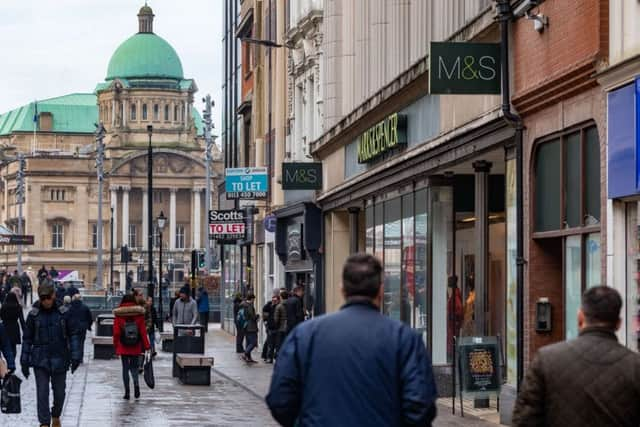Jayne Dowle: We will all pay a high price for the slump in retail jobs
The Altus Group’s annual Commercial Real Estate (CRE) Innovation Report also suggests that behind this serious hit to the labour market, around 23,000 shops are expected to pull up their shutters for the final time.
Advertisement
Hide AdAdvertisement
Hide AdThis newspaper has long been committed to highlighting the importance of keeping our high streets alive. Whether in a rural village, town centre or a suburb on the edge of a city, a thriving retail thoroughfare provides a community with a strong backbone.


Only last week, The Yorkshire Post highlighted the potentially catastrophic effects of Santander bank closing another 10 branches in our region, including those at Otley and Yeadon, which ironically, customers were advised to use after the last round of closures dealt a blow elsewhere. The high street offers not only shops, but vital services such as banking and post offices. Let’s remind ourselves that it also provides millions of jobs too. As this new report reminds us, the internet has much to be responsible for. We can’t stop progress, that is true. However, when it comes to people’s employment and livelihood, we can at least make a stand. And what cannot be ignored is that more than 175,000 people stand to lose their jobs in the retail sector this year.
This is already a big blow to the retail sector which, with 2.9m employees, is the UK’s largest private sector employer, according to the industry body The Retail Appointment. The majority of these employees – 58 per cent – are women, and half of all retail workers do part-time hours. It doesn’t take a statistician to deduce that a large proportion of these part-time employees will also be female and that many of them will be working hours which fit in with their family responsibilities.
For many – and I know plenty of women to whom this applies – working in a shop or a supermarket is often the first step back into the workplace after motherhood.
Advertisement
Hide AdAdvertisement
Hide AdThe Government perhaps does not respect this as much as it should; it preaches about self-sufficiency, yet seems unwilling to recognise that retail jobs are disappearing at an alarming rate, taking with them the financial independence and earning power of those responsible for bringing up children.
The consequences of such unemployment are potentially devastating, not just in personal terms, but also in the knock-on effects on the already creaking benefits system.
If the potential of adding billions to the bill for Universal Credit and all the attendant misery and suffering this can bring is not alarming enough, the Government might want to consider that parents in steady work are the best role models the next generation of children and young people can have.
I urge ministers, who didn’t even see fit to include a retail staff representative on their latest panel to look at the future of the industry, chaired by High Streets minister Jake Berry MP, to think again.
Advertisement
Hide AdAdvertisement
Hide AdTackling the issues affecting the high street is not some add-on to an industrial strategy. Do you remember that particular initiative being talked about with much fanfare and fuss?
It hasn’t borne much fruit since Brexit dominated the agenda, but given the urgent need to create a strong independent UK economy, it really should be at the forefront of any debate. For too long now, retail has been ignored or sidelined, an attitude that’s sadly rooted in snobbery. Or alternatively, regarded as some luxury that is not vital but nice to have.
Retail jobs are real jobs, an important part of what is still referred to as ‘‘British industry’’. They are responsible for the wellbeing not just of individuals, but countless families. It’s time that the Government realised this. It has the power to bring forward legislation to widen the gap between workers and the individuals and conglomerates who preside over the big retail names. Many of our proud British retail brands, including Marks & Spencer, which famously started out as a Leeds market stall, have long made a point of investing in staff.
However, the modern way is to treat shop assistants like nothing more than another expendable resource. Zero-hours contracts, non-unionised workplaces and countless infringements of basic legislation such as the minimum wage and meal-breaks are routinely accepted these days as part of the job with many employers. This should not be happening. The Government should also back a sustained programme of investment and training to create more apprenticeships and upskill workers to meet the changing practices of the industry.
Advertisement
Hide AdAdvertisement
Hide AdAfter all, there is a future, but that future may well be what retail experts call ‘‘experiential’’, in which shops become places not just to buy things but to seek advice, try goods out and visit for leisure as much as for need. This all demands serious and considered attention, not a window display of support.